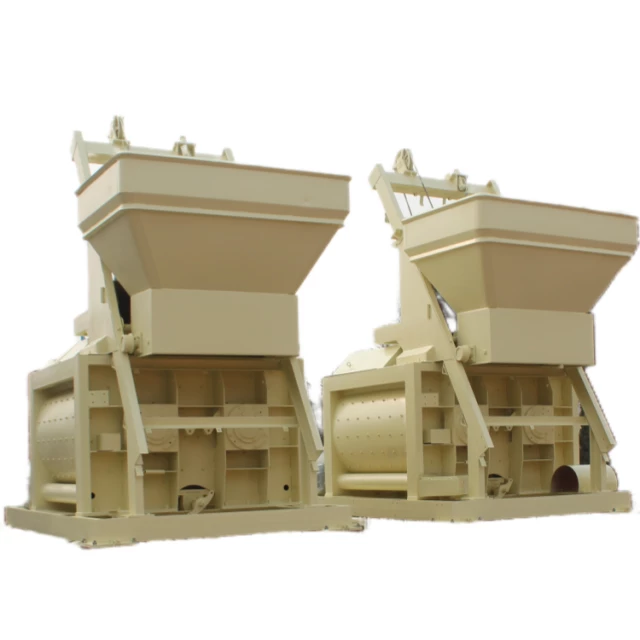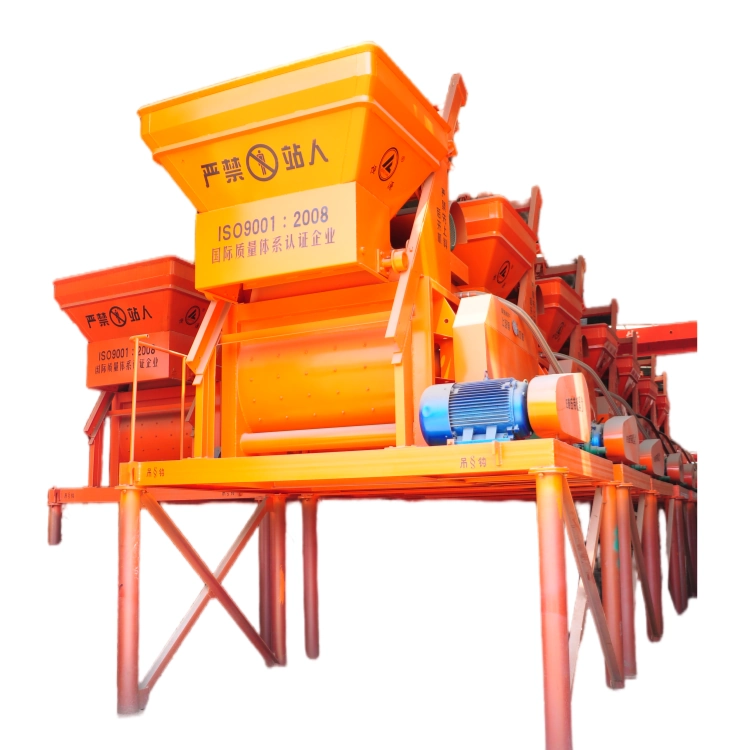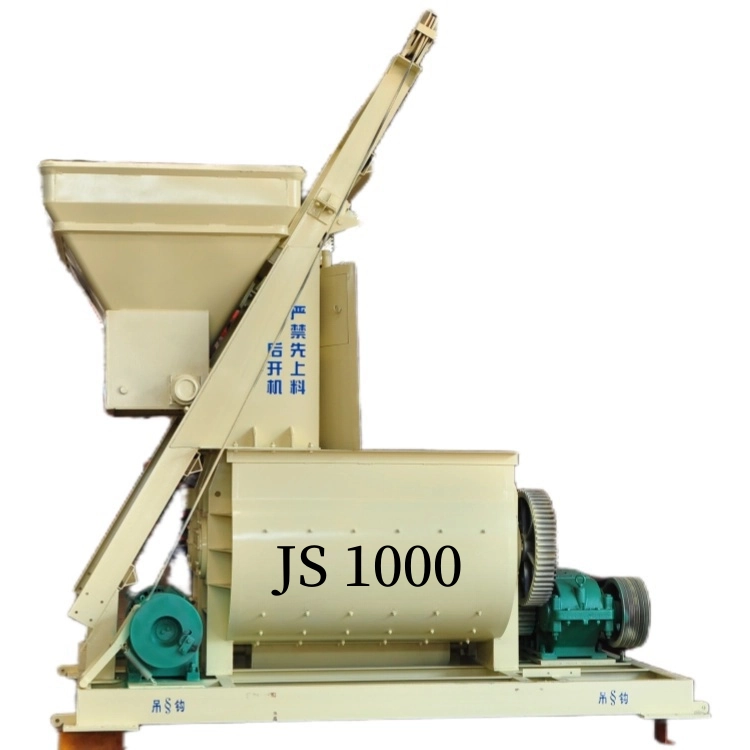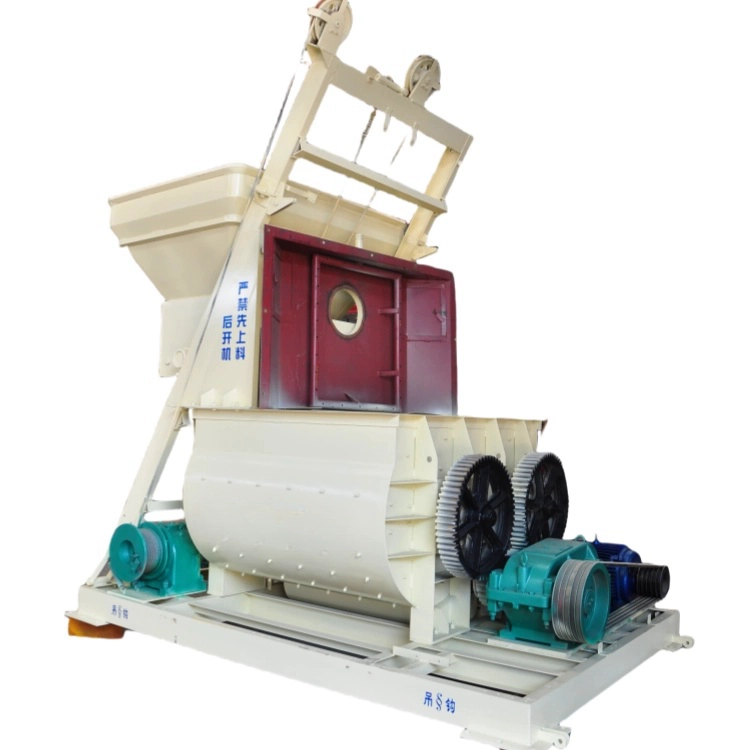
Large Concrete Mixer Machine
JS1000 Volumetric Concrete Mortar Mixer for Sale Skid Steer Cement Mixer
Item Number : JS1000
Price varies based on specs and customizations
- Discharging capacity
- 1000L
- Productivity (m3 /h )
- ≥60
- Dimension Work State (mm)
- 10460*3400*9050
- Weight(kgs)
- 8700
Shipping:
Contact us to get shipping details Enjoy On-time Dispatch Guarantee.
Why Choose Us
Easy ordering process, quality products, and dedicated support for your business success.

Application
The volumetric concrete mixer is an essential piece of equipment in modern construction, offering versatility and efficiency across a wide range of projects. Its applications span various sectors, making it a valuable asset for contractors and builders. Below are some of the key areas where this mixer excels:
-
General Building Construction: This mixer is widely used in the construction of industrial and civil buildings, including residential houses, office buildings, and commercial complexes. It provides the necessary concrete for pouring foundations, columns, beams, slabs, and other structural components, ensuring the structural integrity of the buildings.
-
Road and Bridge Construction: In the construction of highways, city roads, and bridges, the volumetric concrete mixer plays a crucial role. It is used for mixing concrete required for road paving, bridge piers, and girder pouring. The mixer ensures that the concrete used in these projects meets the required strength and stability standards, which are critical for the longevity and safety of the infrastructure.
-
Water Conservancy and Hydropower Projects: The mixer is also suitable for large-scale water conservancy and hydropower projects, such as dams, canals, and sluices. It can produce concrete that meets specific performance requirements, such as seepage resistance and frost resistance, ensuring the durability and functionality of these structures.
-
Prefabricated Components Production: In precast concrete component factories, the mixer is used to produce various types of prefabricated components, including precast panels, beams, and columns. The mixer ensures the uniformity and stability of the components' quality, which is essential for their performance in construction projects.

Feature
The volumetric concrete mixer is designed with several advanced features that enhance its performance and usability. These features make it a preferred choice for contractors and builders. Here are some of the standout features:
-
High Mixing Efficiency: The mixer employs a double horizontal shaft forced mixing principle, which ensures rapid and even mixing of materials. The mixing blades are positioned close to the wall of the mixing cylinder, allowing for quick and thorough mixing. This high efficiency translates to a higher material output per hour, making it suitable for large-scale projects with high-intensity construction demands.
-
Superior Mixing Quality: The angle and shape of the mixing blades have been optimized to create complex convection and shear movements within the cylinder. This ensures that aggregates, cement, and water of different particle sizes are fully mixed, resulting in well-homogenized concrete with less discrete strength variations.
-
Robust Reliability: Key components such as the motor and reducer are sourced from high-quality brands, ensuring the mixer's reliability and longevity. The transmission system has been carefully designed and optimized to withstand harsh working conditions, providing stable operation over extended periods and reducing the likelihood of breakdowns and downtime.
-
User-Friendly Operation and Maintenance: The mixer is equipped with a humanized operation panel that simplifies the mixing process, making it easy to start and operate. Additionally, the mixer's structure is designed to facilitate inspection, repair, and maintenance. The large overhaul space for each component makes it convenient for maintenance personnel to replace parts as needed.
Principle
The volumetric concrete mixer operates on a well-engineered principle that ensures efficient and consistent mixing of concrete. The core principle revolves around the double horizontal shaft forced mixing mechanism, which is designed to deliver high-quality concrete with minimal effort. Here’s a closer look at the working principle:
-
Double Horizontal Shaft Mechanism: The mixer features two horizontal shafts that rotate in opposite directions. This design ensures that the materials inside the mixing cylinder are subjected to intense shearing and convection forces, resulting in a thorough and uniform mix.
-
Optimized Blade Design: The mixing blades are strategically positioned and angled to create a complex movement pattern within the cylinder. This movement ensures that all components of the concrete mix, including aggregates, cement, and water, are evenly distributed and thoroughly blended.
-
Efficient Material Flow: The close proximity of the mixing blades to the cylinder wall allows for efficient material flow and minimal residue buildup. This design ensures that the mixer can handle a wide range of concrete mixes, from ordinary to high-strength and fiber-reinforced concrete, without compromising on quality.
Advantage
The volumetric concrete mixer offers several advantages that make it a standout choice in the construction industry. These advantages are rooted in its advanced design, robust construction, and user-friendly features. Here are some of the key benefits:
-
Versatility: The mixer can be adapted to meet the mixing needs of various types of concrete, including ordinary concrete, high-strength concrete, and fiber-reinforced concrete. This versatility makes it suitable for a wide range of construction projects, from small-scale residential buildings to large-scale infrastructure projects.
-
Consistent Quality: The optimized mixing mechanism ensures that the concrete produced is of consistent quality, with uniform strength and minimal variations. This consistency is crucial for ensuring the structural integrity and longevity of the constructed elements.
-
Reduced Downtime: The robust design and high-quality components of the mixer minimize the risk of breakdowns and downtime. This reliability ensures that construction projects can proceed without unnecessary delays, improving overall project efficiency.
-
Ease of Maintenance: The mixer’s design prioritizes ease of maintenance, with large overhaul spaces and accessible components. This reduces the time and effort required for inspections and repairs, ensuring that the mixer remains in optimal working condition with minimal downtime.
-
Cost-Effectiveness: The high mixing efficiency and reduced downtime translate to cost savings for contractors. The mixer’s ability to produce high-quality concrete quickly and reliably reduces labor costs and material wastage, making it a cost-effective solution for construction projects.

Technical specifications
| Parameter | Details |
|---|---|
| Model | JS1000 |
| Applications | General building construction, Road and bridge construction, Water conservancy and hydropower projects, Prefabricated components production |
| Mixing Efficiency | High, Double horizontal shaft forced mixing principle, Theoretical material output per hour can reach a high level |
| Mixing Quality | Good, Optimized angle and shape of mixing blades, Complex convection and shear movement in the cylinder, Well homogenized concrete with less discrete strength |
| Reliability | Strong, High-quality brand components for motor and reducer, Carefully designed and optimized transmission system, Stable operation for long durations, Reduced breakdown and downtime |
| Operation and Maintenance | Convenient, Humanized operation panel, Simple and easy to understand operation, Easy start, Designed for easy inspection, repair, and maintenance, Large overhaul space for components |
| Application Range | Wide, Adjustable parameters for mixing time, rotating speed, and material proportion, Suitable for different types of concrete such as ordinary, high-strength, and fiber concrete |
FAQ
What Are The Applications Of A Skid Steer Cement Mixer?
What Are The Main Applications Of Concrete Mixers?
What Are The Main Applications Of Mixing Concrete Mixers?
What Are The Main Applications Of Mud Mixer Cement Mixers?
What Is The Principle Of A Construction Mixer Machine?
What Are The Common Applications Of Portable Cement Mixers?
What Are The Main Applications Of Cement Mixing Plants?
What Are The Applications Of A Cement Mixer With Lift?
What Is A Mobile Concrete Mixer?
What Is A Mini Cement Mixer Used For?
What Features Should I Look For In A High-quality Skid Steer Cement Mixer?
What Are The Different Types Of Concrete Mixers Available?
What Are The Key Features Of A Mixing Concrete Mixer?
What Are The Main Components Of A Cement Mixer?
What Are The Advantages Of Using A Construction Mixer Machine?
What Are The Benefits Of Using A Portable Cement Mixer?
What Are The Key Features Of Commercial Concrete Mixing Plants?
How Does A Cement Mixer With Lift Work?
What Are The Main Applications Of A Mobile Concrete Mixer?
What Are The Key Benefits Of Using A Mini Cement Mixer?
What Is The Principle Behind A Skid Steer Cement Mixer?
How Does A Concrete Mixer Work?
How Does A Batch Mixer Work?
What Are The Advantages Of Using A Cement Mixer?
What Are The Common Applications Of Construction Mixer Machines?
What Features Should I Look For In A Portable Cement Mixer?
What Are The Advantages Of Using A Cement Mortar Mixing Plant?
What Are The Advantages Of Using A Cement Mixer With Lift?
How Does A Mobile Concrete Mixer Work?
What Materials Can A Mini Cement Mixer Handle?
What Are The Advantages Of Using A Skid Steer Cement Mixer?
What Are The Advantages Of Using A Concrete Mixer?
What Is The Principle Behind A Volumetric Concrete Mixer?
What Types Of Cement Mixers Are Available?
What Types Of Construction Mixer Machines Are Available?
What Are Some Tips For Using A Portable Cement Mixer Effectively?
How Does A Cement Mixing Plant Work?
Can A Cement Mixer With Lift Be Used For Purposes Other Than Mixing Cement?
What Are The Advantages Of Using A Mobile Concrete Mixer?
How Does A Mini Cement Mixer Work?
Why Is A Skid Steer Cement Mixer Suitable For Tight Workspaces?
What Should I Consider When Choosing A Concrete Mixer?
What Are The Advantages Of Using A Mixing Concrete Mixer?
How Does A Cement Mixer Work?
How Does A Construction Mixer Machine Improve Construction Efficiency?
What Are The Advantages Of Owning A Portable Cement Mixer?
What Components Are Typically Included In A Cement Mixing Plant Setup?
Why Is A Cement Mixer With Lift Beneficial For Construction Sites?
What Types Of Projects Are Best Suited For Mobile Concrete Mixers?
What Are The Advantages Of Owning A Portable Mini Cement Mixer?
Are There Portable Concrete Mixers Available?
How Does A Concrete Mixer Benefit The Environment?
What Should I Consider When Choosing A Cement Mixer?
What Types Of Materials Can A Portable Cement Mixer Handle?
What Types Of Projects Are Cement Mixing Plants Ideal For?
How Does A Mobile Concrete Mixer Improve Efficiency?
Are Mini Cement Mixers Cost-effective?
What Is The Capacity Range Of Concrete Mixers?
What Types Of Projects Are Portable Concrete Mixers Suitable For?
Are Cement Mixers Suitable For DIY Projects?
How Does A Portable Cement Mixer Save Time?
What Are The Environmental Benefits Of Using A Cement Mixing Plant?
What Features Should I Look For In A Mobile Concrete Mixer?
Can Mini Cement Mixers Be Transported Easily?
Can Concrete Mixers Be Used For Other Materials Besides Concrete?
What Should I Consider When Choosing A Concrete Mixer For Large-scale Projects?
Can Cement Mixers Handle Different Types Of Concrete Mixes?
Why Is Portability An Important Feature In Cement Mixers?
How Does A Cement Mixing Plant Ensure High-quality Concrete Production?
Are Mobile Concrete Mixers Cost-effective?
How Does A Mini Cement Mixer Improve Work Efficiency?
What Maintenance Is Required For A Concrete Mixer?
What Maintenance Is Required For A Cement Mixer?
What Should I Consider When Choosing The Capacity Of A Portable Cement Mixer?
What Makes Cement Mixing Plants Cost-effective?
Are There Eco-friendly Concrete Mixers Available?
How Do I Ensure Safety When Using A Cement Mixer?
How Does A Portable Cement Mixer Enhance Cost-effectiveness?
Are Cement Mixing Plants Easy To Transport And Set Up?
4.8 / 5
This mixer is a game-changer! Fast delivery and excellent quality. Highly recommend!
4.7 / 5
Durable and efficient. Perfect for our construction needs. Great value for money!
4.9 / 5
Top-notch technology and reliable performance. Very satisfied with this purchase.
4.6 / 5
The mixer arrived on time and works flawlessly. A must-have for any project!
4.8 / 5
Impressive build quality and easy to operate. Worth every penny!
4.7 / 5
Superb mixer with advanced features. Makes our work so much easier!
4.9 / 5
Excellent product! Delivered quickly and performs beyond expectations.
4.8 / 5
Highly durable and efficient. Perfect for heavy-duty tasks. Love it!
4.7 / 5
Great investment! The mixer is reliable and delivers consistent results.
4.9 / 5
Outstanding performance and quality. A fantastic addition to our equipment!
4.8 / 5
Fast delivery and excellent craftsmanship. This mixer is a real workhorse!
4.7 / 5
Highly efficient and easy to use. Makes our projects run smoothly. Great buy!
REQUEST A QUOTE
Our professional team will reply to you within one business day. Please feel free to contact us!
Related Products

Harbor Freight JS1500 On Site Concrete Mixing Volumetric Cement Mixer
Discover the JS1500 harbor freight cement mixer for large-scale construction and hydraulic projects. High-capacity, efficient, and eco-friendly.

HZS25 Best Cement Mixer for Quick Mix Concrete at Bunnings
Discover the best cement mixer for small to medium construction projects. High productivity, precise batching, compact design. Ideal for versatile applications.

Commercial Electric Concrete Mixer Machine HZS 50 Small Batch Plant for Sale
Discover high-quality concrete mixer machines and batch plants for construction, road, and precast projects. Efficient, precise, and user-friendly.

HZS75 Concrete Batching Plant Cement Mixer Price Concrete Mixer Bunnings Mixing Plant
Optimize your construction projects with the HZS75 concrete batching plant—high efficiency, precise mixing, and automated control for superior results.

HZS120 Ready Mix Concrete Batching Plant Commercial Mud Cement Mixer
HZS120 concrete batching plant: High productivity, precise mixing, automation, and eco-friendly design for large-scale construction projects.

HZS90 Large Multiquip Concrete Mixers for Construction
Discover the HZS90 concrete mixer, ideal for large-scale construction, road, and hydropower projects. High efficiency, precise mixing, and easy installation. Learn more now!

HZS35 Small Cement Concrete Mixing Batch Plant
Optimize your construction projects with our efficient small concrete batch plant. High-quality mixing, precise measurement, and durable design ensure reliable concrete production for diverse applications. Explore now!

HZS180 Ready Mix Concrete Plant for Foundations with Sand and Cement
Optimize your construction projects with our ready mix concrete plant. High efficiency, precise measurement, and advanced automation ensure top-quality concrete for large-scale builds. Explore now!
Related Articles

How to Maintain Hydraulic Systems in Concrete Mixers: A Safety-Focused Guide
Learn how to maintain hydraulic systems in concrete mixers, including fluid checks, leak detection, and safety protocols for optimal performance.

How to Prevent Concrete Strength Loss from Improper Water Addition
Learn how improper water addition weakens concrete and discover strategies to maintain strength while ensuring compliance with ASTM/ACI standards.

How Radial Runout Tolerance Shapes Concrete Mixer Performance and Longevity
Learn how radial runout tolerance impacts concrete mixer performance, longevity, and maintenance costs. Discover calibration methods to prevent costly downtime.

How to Prevent Concrete Setting Failures: Science-Backed Material and Environmental Solutions
Science-backed strategies to prevent concrete setting failures: optimize mix design, adapt to weather, and ensure material quality for durable results.

How Concrete Composition Works: The Science Behind Stronger Structures
Learn the science behind concrete composition, essential ratios for strength, and common mixing mistakes to avoid for durable construction.

How Concrete Mixers Achieve Perfect Homogeneity for Stronger Structures
Discover how concrete mixers enhance homogeneity for 20-30% stronger structures through uniform hydration and segregation control.

How to Safely Inspect Concrete Mixer Electrical Systems: A Compliance-Focused Guide
Learn OSHA-compliant steps to inspect concrete mixer wiring, prevent fires & downtime. Covers NFPA 70E standards, tools & safety checks.

How to Conduct OSHA-Compliant Concrete Mixer Safety Inspections: A Step-by-Step Guide
Learn OSHA-compliant concrete mixer safety inspections to prevent accidents and fines. Essential steps for drum, electrical & hydraulic checks.

How Ignoring Concrete Mixer Manuals Endangers Workers and Invites Legal Consequences
Ignoring concrete mixer manuals risks worker safety and legal penalties. Learn OSHA compliance, accident cases, and best practices for safe operation.

Optimizing Concrete Mixer Safety: How Proactive Tire and Suspension Maintenance Prevents Catastrophic Failures
Learn how proactive tire and suspension maintenance prevents concrete mixer failures, reduces downtime by 60%, and ensures OSHA compliance.

How to Classify and Resolve Concrete Mixer Hazards with Compliance
Learn to classify concrete mixer hazards, implement OSHA-compliant protocols, and document resolutions for safety audits. Essential guide for construction teams.

How to Choose the Right Concrete Type for Every Construction Challenge
Learn how to choose the right concrete type for construction projects—balancing strength, durability, and cost for optimal results.